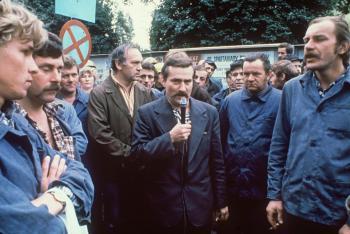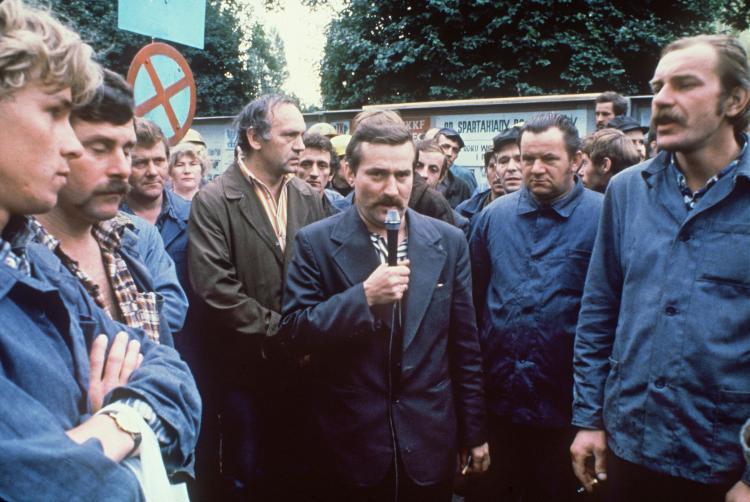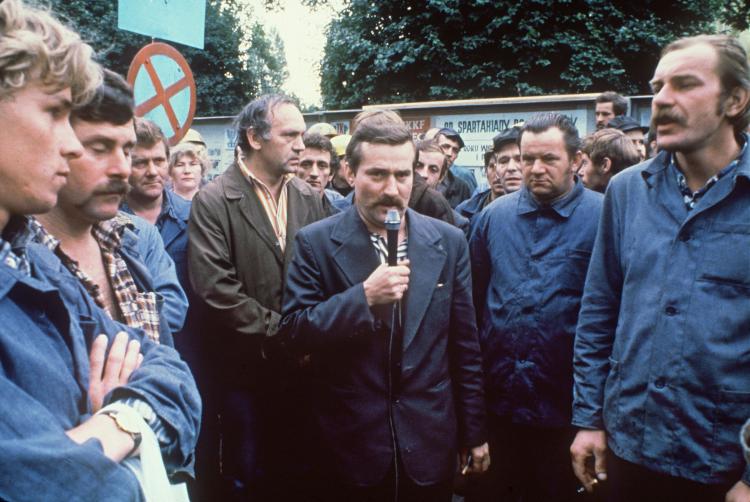WARSAW, Poland—Taking in the makings of a revolution this past week inspired me to look into another.
The reverberations from the Egyptian protests have been coursing through all available networks—wave after wave pounding the senses: Thump! … clips on the Internet show police vans punching through crowds, bodies bouncing into the air; Thump! … the dead and wounded vaulted on shoulders and carried through the crowds, their perceived martyrdom coagulating in real time and with each additional YouTube view; Thump! Thump! Thump! … volleys of rocks bouncing off riot shields—all conveniently captured and posted by a sea of cell phone camera-wielding coincidental correspondents.
Yes, this has decidedly been a weekend of vicarious revolutions for me.
Experiencing the Polish revolution (historically) came in the form of watching—for the very first time, I’m a bit embarrassed to admit—hands-down one of the most powerful films in Polish cinematographic history, and one that won the highest accolades at the Cannes Film Festival, the coveted Palme d’Or, in 1981, the year of its release.
It’s called Man of Iron (it’s on YouTube, with English subtitles, and most definitely worth seeing).
The film is based on real-life events surrounding the emergence of the Solidarity labor union movement and centers on the occupation-strike at the Gdansk Shipyards in 1980, which led to the legalization of the first independent labor union in Poland since the communists took power after World War II.
Not only is the film based on a true story, it actually features the former president of Poland and arguable the most famous contemporary Pole, Lech Walesa. He plays himself, of course, and also features in some archival footage of some key moments in Poland’s recent history.
Man of Iron tells the story of a fictitious character, Maciej Tomczyk, a Gdansk Shipyards worker, who initiates the occupation-strike (an actual event) in which Lech Walesa famously joined as he climbed the perimeter fence and was received by jubilant workers. The strike—and widespread social support for it—ultimately forced the government to sign an agreement legalizing Solidarity, a move that was instrumental in the eventual overthrow of communist rule in Poland. In the film, Tomczyk is a key player and the target of some undesirable secret police attention.
Added to the mix is a public radio journalist, who grapples with his conscience as he goes about preparing a deceitful black PR campaign against Tomczyk. He has been coerced into doing it by the secret police as they intend to take the Gdansk Shipyards by force and eliminate Tomczyk and quell the strike. Knowing full well that Tomczyk’s disappearance would lead to his being lauded a martyr—an unacceptably counterproductive eventuality—the communist secret police are in pursuit of a systematic way of dispelling Tomczyk’s myth.
With historical accuracy, the film ends on a high note: The strike succeeds and a historic agreement is arrived at as Solidarity comes into legal existence.
An interesting and surprising fact about the timing of film is that it was created in the year following the 1980 strike, when the legions of normally strict state censors were on low alert—likely caught up in the heady atmosphere of transformation that permeated the country.
As history would have it, though, unable to cope with the mounting pressure for liberty, the communists did an about-face and delegalized Solidarity toward the end of 1981 and imposed Martial Law.
Solidarity then faced eight years of repression and continued their pro-democracy resistance underground until communism fell in 1989 and Walesa became president.
The reverberations from the Egyptian protests have been coursing through all available networks—wave after wave pounding the senses: Thump! … clips on the Internet show police vans punching through crowds, bodies bouncing into the air; Thump! … the dead and wounded vaulted on shoulders and carried through the crowds, their perceived martyrdom coagulating in real time and with each additional YouTube view; Thump! Thump! Thump! … volleys of rocks bouncing off riot shields—all conveniently captured and posted by a sea of cell phone camera-wielding coincidental correspondents.
Yes, this has decidedly been a weekend of vicarious revolutions for me.
Experiencing the Polish revolution (historically) came in the form of watching—for the very first time, I’m a bit embarrassed to admit—hands-down one of the most powerful films in Polish cinematographic history, and one that won the highest accolades at the Cannes Film Festival, the coveted Palme d’Or, in 1981, the year of its release.
It’s called Man of Iron (it’s on YouTube, with English subtitles, and most definitely worth seeing).
The film is based on real-life events surrounding the emergence of the Solidarity labor union movement and centers on the occupation-strike at the Gdansk Shipyards in 1980, which led to the legalization of the first independent labor union in Poland since the communists took power after World War II.
Not only is the film based on a true story, it actually features the former president of Poland and arguable the most famous contemporary Pole, Lech Walesa. He plays himself, of course, and also features in some archival footage of some key moments in Poland’s recent history.
Man of Iron tells the story of a fictitious character, Maciej Tomczyk, a Gdansk Shipyards worker, who initiates the occupation-strike (an actual event) in which Lech Walesa famously joined as he climbed the perimeter fence and was received by jubilant workers. The strike—and widespread social support for it—ultimately forced the government to sign an agreement legalizing Solidarity, a move that was instrumental in the eventual overthrow of communist rule in Poland. In the film, Tomczyk is a key player and the target of some undesirable secret police attention.
Added to the mix is a public radio journalist, who grapples with his conscience as he goes about preparing a deceitful black PR campaign against Tomczyk. He has been coerced into doing it by the secret police as they intend to take the Gdansk Shipyards by force and eliminate Tomczyk and quell the strike. Knowing full well that Tomczyk’s disappearance would lead to his being lauded a martyr—an unacceptably counterproductive eventuality—the communist secret police are in pursuit of a systematic way of dispelling Tomczyk’s myth.
With historical accuracy, the film ends on a high note: The strike succeeds and a historic agreement is arrived at as Solidarity comes into legal existence.
An interesting and surprising fact about the timing of film is that it was created in the year following the 1980 strike, when the legions of normally strict state censors were on low alert—likely caught up in the heady atmosphere of transformation that permeated the country.
As history would have it, though, unable to cope with the mounting pressure for liberty, the communists did an about-face and delegalized Solidarity toward the end of 1981 and imposed Martial Law.
Solidarity then faced eight years of repression and continued their pro-democracy resistance underground until communism fell in 1989 and Walesa became president.







